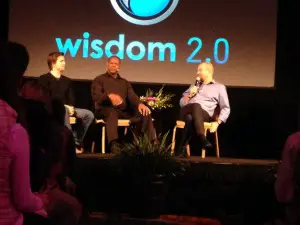The Wisdom 2.0 Bottom Line
March 2, 2015
I spent the last few days at the annual Wisdom 2.0 conference in San Francisco.

Michael Gervais, (left) George Mumford and Mike Robbins (right) discuss sports and psychology and the Wisdom 2.0 conference in San Francisco February 28, 2015,
Many of you have probably never heard of the event, so a little context is probably in order.
Attendance this year reached 2500 and could have gone higher if organizers had not capped it. The conference is designed as a combination celebration and support group for anyone trying to bring more: (pick one) consciousness, gratitude, or mindfulness to technology and business.
Attendees come from all over the world, although a large percentage are from California, to hear a variety of speakers from CEO’s to human resource managers, explain how they have tried to humanize their companies and deal with the increasing demands of the ‘always on’ world.
Using mindful meditation, exhortations to be present, and a wide variety of what many might consider alternative techniques, the conference is in direct contrast to the prevailing view of corporate America as a ruthless, cut throat, bottom line, profit driven culture.
In addition to the conference presentations on everything from neuroscience to networking, there are rooms devoted to meditation, and yoga, as well as a trade show in the Inspiration Lounge.
Many sessions focus on how to live a more fulfilling and compassionate life and to make choices that leave you happier both personally and in your career.
Here you can also find the latest in relaxation and stress reduction equipment and techniques.
While you might think the principles were some import from Europe, most of the foreign attendees, are quick to note that the techniques are uniquely American, which is what draws them here.
Companies with representative include LinkedIn, Facebook, Twitter, Google, Gap and a host of others who say that recent studies have shown conclusively that promoting mindfulness and self realization in their workforce actually adds to their bottom line in quantifiable manner.
In reality the conference is a large networking event, where like-minded folks can get together to reinforce their beliefs in hopes of connecting with someone who can help them move forward in their career.
A large percentage of the attendees are personal/executive coaches or management consultants, who are looking to make connections with those HR types from Google, Twitter, Facebook and GAP, to improve workplace performance. Admittedly the chances are slim, but you never know.
In two days I collected a raft of business cards, and spoke with lawyers, coaches, HR managers and some old friends from the spa and yoga worlds.
My wife, who is a clinical psychologist, and attended the first Wisdom conference 6 years ago, may be a more typical participant, but she was ill over the weekend and insisted I attend.
I’ll admit I was hesitant, but after three days I was pleasantly surprised and happy I made the effort. More on some of the things I learned will come in subsequent posts.
When organizers at the opening session asked who, in the audience, was a first-time attendee, I raised my hand along with two-thirds of the crowd.
Sponsors were thrilled, saying it showed how the movement was attracting new members. But you have to think; what does it mean when attendees at previous sessions are not coming back in significant numbers?
If this were a business that had to rely on new customers for 66% of it’s profit each year, would you be optimistic?
Re-inventing the Wheel at Google
March 19, 2011
A week ago the New York Times, featured an article on a lengthy study done by Google on management practices.
I’ve been stewing about it ever since.
Despite Google’s protestations, it seems to me that they spent a year re-inventing the wheel so that their “data-driven employees” will understand their rationale in trying to improve the performances of the managers.
The study uncovered 8 secrets to better management and Google then ranked the ‘secrets’ and began implementing them. I’ll let you read the list and their implementation on your own, but any executive coach or organizational development consultant, or even any good manager could have created the list and developed a blueprint for implementation.
Yes, having data being behind your plans adds credibility, but so would successful implementation by a professional. What Google really found out what something that every other business discovers: technical expertise does not make you a good manager. Or put another way the skills that you need as an employee are not the same as those that you need as a manager.
I guess in all their vaunted testing they never realized that while logic and test-taking skills may be able to predict employee success, they do not translate directly to the ‘soft skills’ that managers need to make their employees better. Now, as competition grows and other businesses are stealing their employees, they have discovered that managing a staff takes some skill and actually translates to the bottom line.
I worked with first-time managers in a variety of industries and the one unanimous concern they have is that the technical skills that got them noticed as a potential manager have nothing to do with the skills they need once they are promoted. I guess it’s good to know that a year of research by Google has led to the same conclusion.
If that’s not re-inventing the wheel I don’t know what is.
Google has been in the fore
